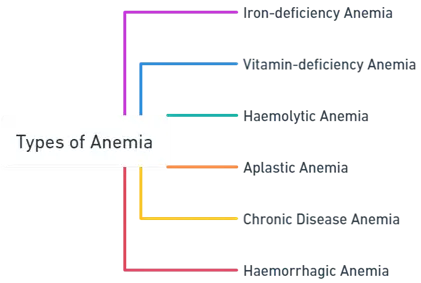Overview of Haematinics:
- Haematinics are medicines used to treat and prevent anemia, a condition marked by a deficiency of healthy red blood cells or hemoglobin.
- Hemoglobin is essential for oxygen transport in the body, and its deficiency can result in symptoms such as fatigue, weakness, shortness of breath, and dizziness.
- Haematinics provide the necessary nutrients for the production of red blood cells and hemoglobin.
Key Components of Haematinics
-
Iron
- Vital for hemoglobin synthesis.
- Deficiency is common in women and children.
- Supplements are available in oral or intravenous forms.
-
Vitamin B12 (Cobalamin)
- Required for red blood cell production and nervous system health.
- Deficiency leads to pernicious anemia.
- Commonly affects older adults and vegetarians due to dietary restrictions or absorption issues.
-
Folic Acid (Vitamin B9)
- Essential for cell production, including red blood cells.
- Deficiency causes megaloblastic anemia.
- Crucial during pregnancy to prevent neural tube defects in the developing fetus.
Mechanism of Action
- Haematinics support erythropoiesis, the production of red blood cells in the bone marrow.
- They work by:
- Increasing the availability of building blocks for hemoglobin synthesis.
- Promoting the proliferation and maturation of red blood cell precursors.
- Correcting nutritional deficiencies that contribute to anemia.
Uses and Indications:
- Iron Deficiency Anemia: Treatment and prevention, especially in high-risk groups.
- Pernicious Anemia and Other B12 Deficiency States: Due to dietary deficiencies, absorption issues, or certain autoimmune conditions.
- Folic Acid Deficiency: Prevention and treatment, particularly in pregnant women to prevent birth defects.
Advertisements
Some common types of anaemia include:
-
Iron-deficiency Anemia:
- Most common type, due to iron shortage for hemoglobin production.
- Causes include poor diet, bad absorption, or increased demand (e.g., pregnancy).
-
Vitamin-deficiency Anemia:
- Results from a lack of vitamins like B12 or folic acid needed for RBC production.
- Pernicious anemia is a B12 deficiency due to no intrinsic factor for absorption.
-
Haemolytic Anemia:
- RBCs are destroyed faster than made, due to inherited (e.g., sickle cell, thalassemia) or acquired reasons (e.g., autoimmune, infections).
-
Aplastic Anemia:
- Rare, severe type; bone marrow fails to make enough RBCs.
- Causes include radiation, certain drugs, or autoimmune diseases.
-
Chronic Disease Anemia:
-
Haemorrhagic Anemia:
- From significant blood loss (trauma, surgery, heavy periods), depleting RBCs and iron.


